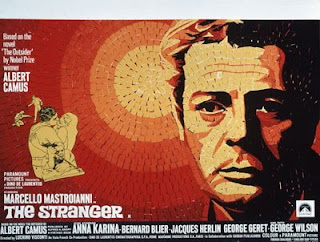
C., it’s funny you should point out that particular passage from The Stranger, because it, along with a few others, provides a key insight into an element of Meursault’s character that is usually ignored. The oft-repeated response of first-time readers, whether they like the book or not, is that Meursault lacks any sort of emotions, but the passage you point out quite clearly demonstrates an emotion: happy.
See for yourself: "I shook off the sweat and sun. I knew that I had shattered the harmony of the day, the exceptional silence of a beach where I'd been happy."
And to take the next logical step, the past tense demonstrates another emotion: unhappy (which, of course, is synonymous with any number of other emotion words).
There’s also something else about that passage that I think is important and am consistently surprised to never hear mentioned, though, to be fair, the scholarship on The Stranger is voluminous and it is quite possible I have just not come across it yet. Nonetheless, everyone who has read the book mentions all of the sun and heat references throughout. The culmination of this being Meursault’s reasoning for shooting the Arab on the beach: the sun was in my eyes.
Academics and casual readers alike have debated what this could possibly mean ever since the book’s emergence in 1942. Some of the theories are quite imaginative (childhood trauma—the sun represents the light at the end of the birth canal), some very physical and logical (he tensed up with the sweat and sun in his eyes—keep in mind, no first-person pronoun in the first shooting sentence), and some controversial (he’s a racist—the sun reminded him of his whiteness and thus he shot the Arab, a non-white).
I’m doing myself a disservice by posting this without a copy of the book in hand, but no one ever mentions the hints throughout the book that the sun is a representation of his mother, the sun, the moon, and the stars, which of course links back to another theory I have regarding the translation of that very famous first sentence of the book.
Regardless of how you want to translate Maman (a whole separate issue), the full sentence has been translated twice into English as ‘Maman/Mother died today.’ The problem here is that we are ignoring something very important about the original French structure: “Aujourd’hui, Maman est morte.” Quite literally: “Today, Maman is dead.”
While some may think it a stretch, it seems hard to believe that Camus, who was so very precise about his stylistic usage, did not have some intention with this sentence, which, for my money, lays out Meursault’s world, showing us an ordering of what is important: the first, and most important, thing is Today, right now, this moment. The second, the thing that causes everything else in this novel, Mother. And the third, the thing that finishes it off, that comes at the end of the sentence (and yes, think about that in every sense of both the book and life—the end of the sentence), is Death.
If this theory is correct, the English translation is a pretty big gaffe (which only goes to highlight the incredible difficulty of translation).
So, returning to your passage, C., Meursault is like a bottle up until this point, unbeknownst to him, and when the sun gets in his eyes, he is reminded of his mother (and her recent death) and he is in fact blinded for a moment, in which, without thought, the trigger is pulled. The famous four shots that follow are simply steam escaping the sides of a lid.

No comments:
Post a Comment